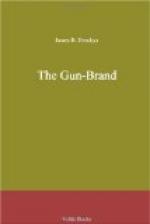Slowly he turned from the spot and, with heavy steps, entered the post-store. He raised the pack that contained the samples from the floor, and, walking to the verge of the high cliff that overlooked the river, hurled it far out over the water, where it fell with a dull splash that was drowned in the roar of the rapids.
“Ye’ll tak’ charge here the noo, laddie?” asked McTurk, the grizzled chief trader, the following day when MacNair had concluded the inspection of his father’s papers. “‘Twad be what he’d ha’ counselled!”
“No,” answered the young man shortly, and, without a word as to the finding of the lost mine, hurried Old Elk and Wee Johnnie Tamarack into a canoe and headed southward.
A month later the officers of the Hudson Bay Company in Winnipeg gasped in surprise at the offer of young MacNair to trade the broad acres to which his father had acquired title in the wheat belt of Saskatchewan and Alberta for a vast tract of barren ground in the subarctic. They traded gladly, and when the young man heard that his dicker had earned for him the name of Fool MacNair in the conclave of the mighty, he smiled—and bought more barrens.
All of which had happened eight years before Chloe Elliston defied him among the stumps of her clearing, and in the interim much had transpired. In the heart of his barrens he built a post and collected about him a band of Indians who soon learned that those who worked in the mines had a far greater number of brass tokens of “made beaver” to their credit than those who trapped fur.
Those were hard years for Bob MacNair; years in which he worked day and night with his Indians, and paid them, for the most part, in promises. But always he fed them and clothed them and their women and children, although to do so stretched his credit to the limit—raised the limit—and raised it again.
He uncovered vast deposits of copper, only to realize that, until he could devise a cheaper method of transportation, the metal might as well have remained where the forgotten miners had left it. And it was while he was at work upon his transportation problem that the shovels of his Indians began to throw out golden grains from the bed of a buried creek.
When the news of gold reached the river, there was a stampede. But MacNair owned the land and his Indians were armed. There was a short, sharp battle, and the stampeders returned to the rivers to nurse their grievance and curse Brute MacNair.
He paid his debt to the Company and settled with his Indians, who suddenly found themselves rich. And then Bob MacNair learned a lesson which he never forgot—his Indians could not stand prosperity. Most of those who had stood by him all through the lean years when he had provided them only a bare existence, took their newly acquired wealth and departed for the white man’s country. Some returned—broken husks of the men who departed. Many would never




